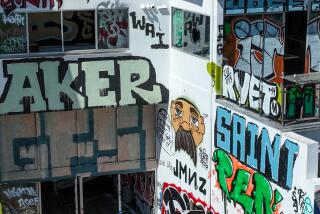Billboard settlement draws criticism
The signs of the times are about to change in L.A., and a lot of people are unhappy about it.
A controversial court settlement between the city and two major outdoor advertising companies could get a judge’s approval as early as today, making more than 800 billboards eligible for an upgrade. Changes can include second faces, digital fronts and movable slats.
Following the settlement, something akin to billboard amnesty will take effect. Dozens of outdoor signs that were previously altered illegally can get permits without penalty.
Advocates fighting billboard proliferation say the settlement represents a capitulation by the city to industry giants Clear Channel Outdoor Inc. and CBS Outdoor Inc. They worry that the settlement could have national implications because it would allow companies to sue to circumvent a ban on new signs that the City Council passed in 2002.
“It’s an aesthetic and environmental disaster,” said Gerald Silver, co-founder of the Coalition to Ban Billboard Blight. “The city is going to look like Las Vegas at its worst.”
The settlement arises out of a 2002 city ordinance that would have required billboard companies pay an annual fee to fund a sign inspection program. Several firms sued the city, arguing that the more than $300-per-sign fee was too high and that the program violated free-speech rights. A tentative settlement was announced in September.
Councilman Jack Weiss, who introduced the ordinance, said that the settlement fell short, but that the city needed to put the litigation behind it. “I would not characterize how I feel as happy with it,” he said. “I wish it had been a stronger settlement.”
Critics say the settlement means the city has decided to look the other way instead of holding companies accountable for skirting the law. “You’ve rewarded the companies for years and years of bad behavior by turning something that was illegal into something legal,” said Kevin Fry, president of Scenic America, a national organization working against billboard blight
But City Atty. Rocky Delgadillo has praised the settlement, noting that it funds a new billboard inspection program to enhance public safety.
Another problem the settlement hopefully would fix is tracking outdoor signs. According to Delgadillo’s office, there are scores of billboards with no permit at all or not complying.
A spokesman for Clear Channel Outdoor said the company could not comment on ongoing litigation or on individual signs. New York-based CBS Outdoor did not reply to calls seeking comment.
In exchange for being allowed to modernize the signs, the companies will pay an annual inspection fee and take down 3% of their billboards. CBS Outdoor has 1,628 signs in the city, and Clear Channel has 1,657, according to the settlement.
Settling their differences with the city is important to outdoor advertising firms because L.A. and its car culture make for a lucrative market. Billboards generate fat profits and hold even more promise as the use of digital signs expands.
Clear Channel Communications generated more than $2 billion from outdoor advertising during the first nine months of last year. Laura Martin, senior media analyst at New York-based Soleil Securities Group Inc., said she believed that a pending takeover premium for San Antonio, Texas-based Clear Channel Communications, which is trying to go private, was largely due to its ownership of Clear Channel Outdoor.
According to the Los Angeles Municipal Code, it is a misdemeanor to alter signs without a permit. But it’s been a common practice, according to records from the Los Angeles Department of Building and Safety.
Companies illegally alter signs when they make their poles higher, add an additional face, enlarge them or change the angle they face without seeking the proper permits. By making signs more visible to drivers on the freeway, for example, companies can charge advertisers more.
Nobody knows how many billboards lack permits, but Chris Carlile, who has helped erect signs throughout the city, believes there are hundreds.
“There are a very large number of signs in the city that have been altered, raised, backed up to a freeway or just built without the correct permit,” Carlile said. A Clear Channel sign at 2356 Cotner Ave., for example, has two faces but is allowed only one under its permit. Many second faces have been added to signs throughout the city, Carlile said.
The Coalition to Ban Billboard Blight, a local organization of activists and homeowners, has tried to stop the settlement, arguing that it could set a bad precedent for other cities. But Judge Ralph Dau denied its motion in January, saying the organization was too late.
“If a small town caves into billboard companies, that’s one thing,” coalition attorney Jerome S. Cohen said. “But if the city of Los Angeles caves in, that’s another thing altogether.”
*
More to Read
Sign up for Essential California
The most important California stories and recommendations in your inbox every morning.
You may occasionally receive promotional content from the Los Angeles Times.











